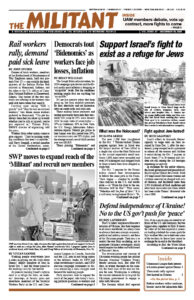Hamas hoped its Oct. 7 pogrom that slaughtered 1,200 people and wounded more than 5,000 would terrorize and demoralize Jews and all those who work with Jews in Israel.
Instead, the assault has strengthened the will of working people to defend Israel as a refuge for Jews and to struggle to overcome divisions fostered by the bosses and capitalist government so that Jewish, Arab and immigrant workers can more effectively join together.
Many villages and workplaces in Israel near the borders with Gaza and Lebanon have closed down and 150,000 people have been forced to relocate, often losing their jobs.
Israel’s parliament voted to compensation to businesses affected by the war. But laid-off workers only get unemployment benefits, based on a maximum of 60% of their wages over the previous six months. Because the pogrom took place amid the holiday season when workers put in fewer hours, their weekly check ends up being even less than 60% of their regular wage, Yaniv Bar Ilan, a spokesperson for the Koach LaOvdim (Power to the Workers) union federation, told the Militant by phone.
Jewish and Arab child care workers who belong to Koach LaOvdim in Jerusalem have seen their income cut by a third because of war-related closures. They took to the streets and threatened to strike, forcing the city government to agree to partial compensation.
The role that Arab citizens of Israel played in rescuing people at the music festival Oct. 7 and the number of Arab and immigrants killed or taken hostages by Hamas is widely known, Bar Ilan said. “A Bedouin bus driver and member of our union still has two relatives being held by Hamas.” This opens the door to unite Jewish and Arab workers in common struggle.
Nonetheless, most public bus drivers — who are in their majority Arabs — didn’t come back to work until two weeks after Oct. 7, worried about harassment by a small but vocal minority of passengers. Most of the drivers are disgusted by Hamas’ acts, Bar Ilan said, and “are insulted when some passengers call them ‘Hamasnics.’”
“We are encouraging drivers to get the union involved,” he said. “We have called on the Ministry of Transport to issue a statement condemning this harassment, but they have ignored us.”
“What happened on Oct. 7 was terrifying and horrible,” Assia Ladizhinskaya, a spokesperson for Kav LaOved (Worker’s Hotline), told the Militant by phone from Tel Aviv Nov. 27. Kav LaOved is an organization that advocates “on behalf of the most marginalized workers.”
After the pogrom, the Israeli government canceled the work permits for Palestinians from the West Bank and Gaza. “One day they were welcome and often the main workers in construction and agriculture and the next day they have no income,” Ladizhinskaya said. “The government made an exception for 8,000 ‘essential’ workers from the West Bank.”
“We don’t expect everybody working here to love Israel,” she said. “But out of 100,000 Palestinians from the West Bank who have worked in Israel for years, you can count on one hand those that have been involved in terrorist acts.
“Israeli citizens who lost their jobs because of the war get unemployment benefits. But Palestinians from the West Bank and Gaza don’t. Many have trouble getting their last paychecks from their employers,” she said. “We defend all workers, no matter where they are from.”
Koach LaOvdim, Kav LaOved and many Israeli workers want the government to reinstate the work permits for West Bank residents.
Migrant farmworkers
Before Oct. 7 there were some 30,000 farmworkers, mostly from Thailand, with permits that allow them to stay in Israel for five years. After the Hamas pogrom, which included the killing or kidnapping of dozens of migrant farmworkers, “about 9,000 went back home,” Ladizhinskaya said.
“If given the chance, I would return,” Thai farmworker Natthawaree Mulkan, one of the Thais held hostage and released at the start of the “pause,” told the press from Thailand. “There were many good things [in Israel] that left a lasting impression in our hearts.” Tens of thousands of workers in Israel have been volunteering to tend the fields near Gaza in face of the shortage of farmworkers, until the government recruits more foreign migrant workers.
“Migrant farmworkers are more vulnerable,” Ladizhinskaya said. “They don’t have safe rooms where they live. They may never have heard the sound of a siren and know they have to take cover from incoming rockets from Gaza. Some employers send them out to the fields when they know there is danger, because they care more about their money than the lives of the workers.”
These struggles show that there are opportunities to bring Jewish, Arab and immigrant workers together. A decisive defeat of Hamas in Gaza would increase those opportunities.

